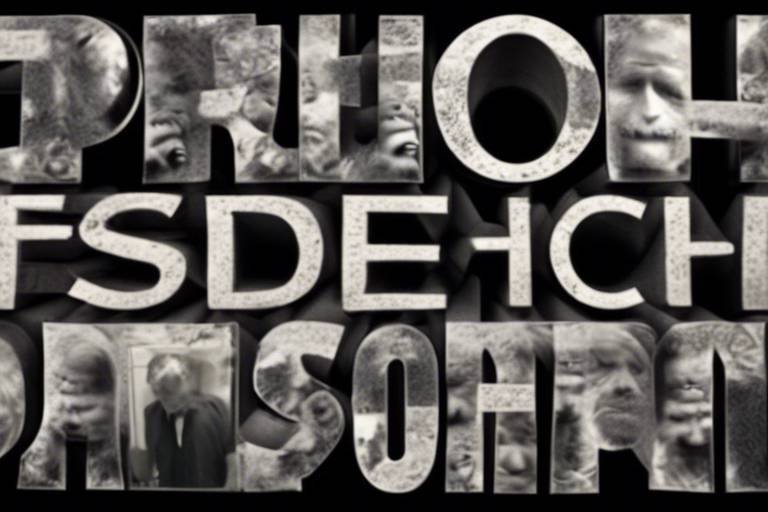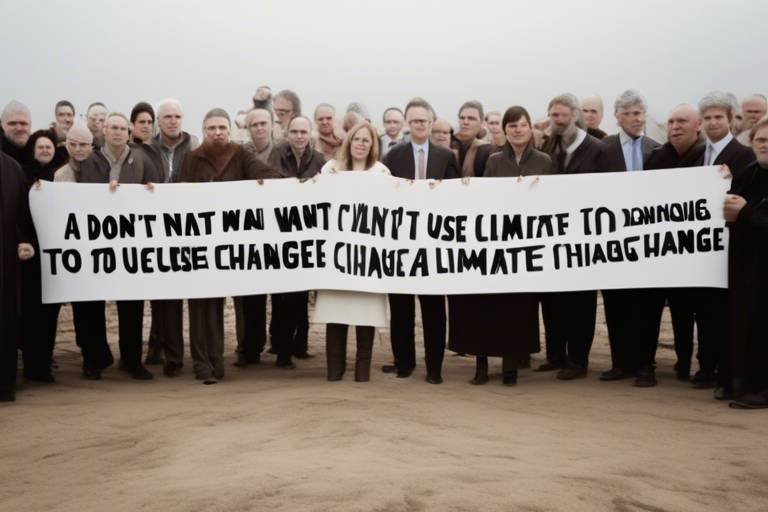The Philosophy and Politics of Cyber Warfare
In today's hyper-connected world, the battlefield has extended beyond the physical realm into the vast, complex landscape of cyberspace. This evolution has sparked a profound transformation in how we understand and engage in conflict. Cyber warfare is not just about hacking into systems or launching digital attacks; it encompasses a myriad of philosophical and political dimensions that challenge our traditional notions of warfare, ethics, and statecraft. As we delve into this intricate relationship, we must ask ourselves: what are the implications of this new form of warfare on our moral frameworks, our understanding of state sovereignty, and our future as a global community?
The intersection of philosophy and politics in cyber warfare raises critical questions about the ethical implications of using technology as a weapon. For instance, can we justify a cyber attack that disables a nation's power grid? What about the potential for collateral damage to innocent civilians? The answers to these questions are not straightforward, as they require us to navigate the murky waters of just war theory and the ethical responsibilities of state actors.
Moreover, the political ramifications of cyber warfare are equally significant. As states engage in cross-border cyber operations, traditional concepts of sovereignty are being tested. How do we hold nations accountable for attacks that originate from their territory but are executed by non-state actors? This complexity complicates international law and diplomatic relations, creating a new paradigm that demands our attention and critical analysis.
As we explore the philosophical underpinnings of cyber warfare, we will also consider its role as a tool of statecraft. Countries are increasingly utilizing cyber operations as a means to achieve strategic objectives, whether it's disrupting an adversary's infrastructure or gathering intelligence without the need for boots on the ground. This shift not only alters the landscape of warfare but also invites us to reconsider the ethical implications of using technology in such a manner.
Ultimately, the future of cyber warfare is uncertain, filled with both challenges and opportunities. As we stand on the brink of a new era defined by rapid technological advancements, we must remain vigilant in our examination of the ethical, political, and philosophical dimensions of this evolving conflict. The question remains: how will we navigate this brave new world, and what principles will guide our actions in the face of unprecedented challenges?
- What is cyber warfare? Cyber warfare refers to the use of digital attacks by one nation to disrupt the vital computer systems of another, often with the aim of causing damage or gaining strategic advantage.
- How does cyber warfare challenge traditional warfare concepts? Cyber warfare blurs the lines between combatants and non-combatants, complicates the rules of engagement, and raises questions about sovereignty and accountability.
- What are the ethical implications of cyber warfare? Ethical concerns include the potential for civilian casualties, the justification of attacks on infrastructure, and the responsibilities of state actors in protecting their citizens.
- What role does technology play in cyber warfare? Advancements in technology shape strategies and ethical considerations, influencing how states conduct operations and respond to threats.
- What is the future of cyber warfare? The future of cyber warfare is likely to be shaped by emerging technologies, evolving legal frameworks, and the ongoing need for ethical guidance in conflict scenarios.

The Ethical Dimensions of Cyber Warfare
In the ever-evolving landscape of conflict, cyber warfare presents a unique set of ethical dilemmas that demand our attention. Unlike traditional warfare, where the lines between combatants and civilians are often clear, the digital battlefield blurs these boundaries significantly. This raises profound questions: What constitutes a legitimate target in cyberspace? and How do we reconcile the need for national security with the protection of civilian lives?
At the heart of the ethical debate is the concept of just war theory, which traditionally serves as a framework for evaluating the morality of warfare. This theory posits that for a war to be just, it must meet certain criteria, such as just cause, proportionality, and discrimination between combatants and non-combatants. In the realm of cyber warfare, however, these criteria become complicated. For instance, when a cyber attack targets critical infrastructure—like power grids or hospitals—what are the implications for civilian safety? The potential for widespread harm raises the stakes and complicates the moral calculus.
Moreover, the anonymity that cyber warfare affords its perpetrators complicates ethical accountability. Unlike conventional military engagements, where the identity of combatants is often known, cyber attacks can be executed with relative impunity. Who is responsible when a nation-state launches a cyber operation that inadvertently harms civilians? This question highlights the ethical responsibilities of state actors in the digital realm. As nations increasingly turn to cyber capabilities to achieve their strategic objectives, the need for a robust ethical framework becomes more pronounced.
Consider the implications of targeting civilian infrastructure in cyber conflicts. The potential for collateral damage is significant, and the ethical ramifications are profound. Is it ever justifiable to compromise civilian safety for the sake of national security? This question challenges us to think critically about the moral responsibilities of those who wield cyber weapons. As we navigate these complex waters, it becomes essential to establish guidelines that prioritize the protection of innocent lives while still allowing for legitimate statecraft.
Furthermore, as we delve deeper into the ethical dimensions of cyber warfare, we must also consider the role of international law. Current legal frameworks governing armed conflict, such as international humanitarian law, were largely designed with traditional warfare in mind. The unique characteristics of cyber operations—such as their speed, scale, and the difficulty of attribution—pose challenges to these existing laws. As a result, there is a pressing need for new regulations that specifically address the ethical implications of cyber warfare.
In summary, the ethical dimensions of cyber warfare are complex and multifaceted. As we continue to grapple with issues of accountability, civilian safety, and the legal frameworks that govern these conflicts, it is crucial to engage in ongoing dialogue about the moral responsibilities of state actors in the digital age. Only through this engagement can we hope to navigate the turbulent waters of cyber warfare with a sense of ethical clarity and responsibility.
- What is cyber warfare? Cyber warfare refers to the use of digital attacks by one nation to disrupt the vital computer systems of another, often targeting critical infrastructure.
- What are the ethical concerns related to cyber warfare? Ethical concerns include the potential for civilian casualties, the challenge of accountability, and the need for new legal frameworks to govern cyber operations.
- How does just war theory apply to cyber warfare? Just war theory provides a moral framework for evaluating the legitimacy of warfare, but its application in cyber conflict is complicated by issues such as anonymity and the targeting of civilian infrastructure.
- Why is attribution difficult in cyber warfare? Attribution is challenging because cyber attacks can be launched from anywhere in the world, often obscuring the identity of the attacker and complicating responses.

The Role of State Sovereignty
In the age of digital warfare, the concept of state sovereignty is being put to the test like never before. Traditionally, sovereignty has been understood as the absolute authority of a state over its territory and the people within it. However, the rise of cyber warfare has blurred these lines, challenging our conventional understanding of what it means to be a sovereign state. Imagine a world where a nation can launch an attack from thousands of miles away, targeting critical infrastructure without ever physically crossing a border. This is the reality we face today, and it raises significant questions about the implications for international law and diplomatic relations.
One of the most pressing issues is how cross-border cyber operations complicate the principle of sovereignty. When a nation-state conducts a cyber attack against another, it often does so without the need for military presence or declaration of war. This raises the question: if a cyber attack is launched from one country to another, does the attacked nation have the right to respond with force? The answer is not as straightforward as it may seem. The existing legal frameworks struggle to keep pace with the rapid evolution of technology, leaving a gray area that can lead to misinterpretations and escalating conflicts.
Moreover, the anonymity that the digital realm provides complicates accountability. In traditional warfare, it is often clear who the aggressor is, but in cyberspace, attacks can be masked, making it difficult to pinpoint the responsible state actor. This lack of clarity can lead to misattribution, where a state might retaliate against the wrong target, further escalating tensions. For instance, if a cyber attack is traced back to a specific IP address, but that address has been spoofed or hijacked, the consequences could be dire. The potential for miscalculation in this new arena of warfare is a significant concern for global stability.
To illustrate the complexities of state sovereignty in the context of cyber warfare, consider the following table:
| Aspect | Traditional Warfare | Cyber Warfare |
|---|---|---|
| Location of Attack | Physical territory | Digital space |
| Attribution | Clear identification of aggressor | Difficult to ascertain |
| Response Protocol | Military response | Legal and diplomatic challenges |
| Implications for Civilians | Direct impact on civilian life | Indirect consequences through infrastructure damage |
As we navigate this uncharted territory, it is crucial for nations to engage in dialogue about the implications of cyber warfare on state sovereignty. The need for international cooperation and the establishment of clear norms and regulations is paramount. Countries must work together to create frameworks that address the challenges posed by cyber operations, ensuring that sovereignty is respected while also recognizing the realities of modern conflict.
In conclusion, the role of state sovereignty in the realm of cyber warfare is a complex and evolving issue. As we continue to grapple with the implications of digital conflicts, it is essential to understand that the traditional notions of sovereignty may need to be redefined. The future of international relations will depend on our ability to adapt to these changes and find common ground in a world where the lines between war and peace are increasingly blurred.
- What is state sovereignty? State sovereignty refers to the authority of a state to govern itself and make decisions without external interference.
- How does cyber warfare challenge state sovereignty? Cyber warfare challenges state sovereignty by allowing attacks to occur across borders without physical presence, complicating legal and diplomatic responses.
- What are the implications of misattribution in cyber attacks? Misattribution can lead to wrongful retaliation, escalating conflicts and endangering international relations.
- Why is international cooperation important in cyber warfare? International cooperation is essential to establish norms and regulations that respect state sovereignty while addressing the realities of cyber conflicts.

In the realm of cyber warfare, the concept of civilian casualties takes on a new and complex dimension. Unlike traditional warfare, where the physical destruction of life and property is often visible and quantifiable, the effects of cyber attacks can be insidious and far-reaching. Imagine a scenario where a nation-state launches a cyber attack on another country's power grid. While the attack might aim at crippling military infrastructure, the reality is that countless civilians are left without electricity, water, or even access to critical medical services. This raises profound ethical questions: How do we account for the unintended consequences of cyber warfare?
One of the most troubling aspects of cyber attacks is that they can lead to indirect civilian casualties. These casualties may not be immediately apparent, as they arise from the cascading effects of the initial attack. For instance, if a cyber attack disrupts healthcare systems, patients may suffer due to the inability to access necessary medical treatments or emergency services. The moral responsibility of state actors in such scenarios becomes a contentious issue. Should they be held accountable for the fallout of their actions, even when their primary targets were military or governmental?
Furthermore, the anonymity of cyber warfare complicates the issue of accountability. In physical warfare, it’s often clear who is responsible for an attack. However, in cyberspace, the lines blur. A cyber attack could be carried out by state-sponsored hackers, non-state actors, or even individuals with no clear affiliations. This ambiguity makes it challenging to assess the full impact of an attack on civilian populations and complicates international responses.
To illustrate the potential impact of civilian casualties in cyber warfare, consider the following table that outlines some notable cyber attacks and their unintended consequences:
| Cyber Attack | Year | Target | Unintended Civilian Consequences |
|---|---|---|---|
| Stuxnet | 2010 | Iranian Nuclear Facilities | Disruption of civilian energy supply and potential environmental hazards |
| Ukraine Power Grid Attack | 2015 | Ukrainian Power Grid | Widespread blackouts affecting hospitals and emergency services |
| WannaCry Ransomware | 2017 | Global Healthcare Systems | Delayed medical procedures and compromised patient data |
As we delve deeper into the implications of civilian casualties in cyber warfare, we must also consider the ethical frameworks that govern these actions. The principles of just war theory suggest that warfare must adhere to certain moral standards, including the distinction between combatants and non-combatants. Yet, in the digital age, this distinction becomes increasingly blurred. How do we navigate these ethical waters when the battlefield is virtual, and the effects can be so widespread?
Ultimately, as we continue to grapple with the realities of cyber warfare, it is essential to foster a dialogue about the ethical responsibilities of state actors. We must ask ourselves: What measures can be put in place to protect civilian populations from the collateral damage of cyber attacks? The answers may lie in developing robust international agreements and frameworks that prioritize the protection of civilians in the digital landscape.
- What constitutes a civilian casualty in cyber warfare?
Civilian casualties in cyber warfare refer to unintended harm or disruption caused to non-combatants as a result of cyber attacks aimed at military or governmental targets. - How can accountability be established for cyber attacks?
Establishing accountability for cyber attacks is challenging due to the anonymity of the perpetrators. International law and agreements may need to evolve to address these complexities. - What ethical frameworks apply to cyber warfare?
Ethical frameworks such as just war theory and utilitarianism can be applied to assess the morality of cyber warfare actions and their consequences for civilian populations.

Attribution in the realm of cyber warfare is akin to solving a complex puzzle where the pieces are often obscured by layers of deception. When a cyber attack occurs, pinpointing the exact source can feel like trying to find a needle in a haystack. This challenge arises from the very nature of the internet, which allows attackers to operate anonymously and to mask their true locations. As a result, state actors and organizations often face immense difficulty in determining whether a cyber attack is the work of a foreign government, a rogue hacker, or even a group of cybercriminals.
The implications of inaccurate attribution are profound. For instance, if a country misattributes a cyber attack, it could lead to escalated tensions or even military responses based on faulty intelligence. This uncertainty creates a precarious balance in international relations, where the threat of retaliation looms large, yet the actual culprits remain shrouded in mystery. The consequences of such misattributions can range from diplomatic fallout to economic sanctions, highlighting the need for improved methods of identifying cyber adversaries.
Moreover, the technical challenges of attribution are compounded by the legal and political landscapes. The lack of a clear, universally accepted framework for what constitutes a cyber act of war further complicates matters. States may have different thresholds for what they consider an act of aggression, leading to varied responses based on their interpretations. This disparity can create a chaotic environment where the rules of engagement are unclear, leaving nations to navigate this digital battleground with caution.
To illustrate the complexity of attribution, consider the following table that outlines some common challenges faced by nations in identifying cyber threats:
| Challenge | Description |
|---|---|
| Anonymous Actors | Cyber attackers can easily hide their identities using various techniques, including VPNs and the dark web. |
| False Flags | Attackers may deliberately mislead investigations by routing attacks through third-party servers. |
| Attribution Tools | Current tools for tracking cyber attacks often lack precision, making it hard to accurately trace origins. |
| Political Implications | Attribution can be influenced by political motivations, leading to biased conclusions. |
In light of these challenges, nations are investing in advanced technologies and methodologies to enhance their attribution capabilities. This includes the development of sophisticated algorithms that analyze patterns of behavior and the use of artificial intelligence to sift through vast amounts of data. Yet, as technology evolves, so too do the tactics of cyber attackers, creating a continuous cycle of challenge and response.
Ultimately, the quest for accurate attribution in cyber warfare is not just a technical issue; it is a philosophical and political dilemma that raises questions about accountability, justice, and the very nature of warfare in the digital age. As we navigate this uncharted territory, it becomes increasingly clear that collaboration among nations, shared intelligence, and a commitment to establishing clearer norms in cyberspace are essential to overcoming these daunting attribution challenges.
- What is cyber warfare? Cyber warfare refers to the use of digital attacks by one nation to disrupt the vital computer systems of another, often to achieve military or political objectives.
- Why is attribution important in cyber warfare? Accurate attribution is crucial for holding perpetrators accountable and determining appropriate responses to cyber attacks.
- What are some methods used for attribution? Methods include analyzing attack patterns, examining malware signatures, and leveraging intelligence from various security agencies.
- Can cyber attacks be considered acts of war? Yes, depending on the scale and impact of the attack, nations may classify cyber attacks as acts of war, which can lead to military responses.

As we plunge deeper into the digital age, the legal frameworks governing cyber warfare become increasingly crucial. Traditional laws of war, such as the Geneva Conventions, were designed for a world where battles were fought on physical fields, with clear combatants and civilians. However, in the realm of cyber warfare, the lines are blurred. The anonymity and speed of cyber operations present unique challenges that existing legal structures struggle to address.
One of the significant issues is the applicability of international humanitarian law (IHL) to cyber warfare. IHL is meant to protect those who are not participating in hostilities, such as civilians and medical personnel. Yet, in a cyber conflict, the distinction between combatants and non-combatants can be ambiguous. For instance, a cyber attack that disrupts a nation’s power grid may not only target military installations but also affect hospitals and homes, causing widespread civilian harm. This raises pressing questions: How do we define a legitimate target in cyberspace? And what are the responsibilities of state actors in ensuring civilian safety?
Moreover, the challenge of attribution complicates legal accountability. In the physical world, it is often easier to trace an attack back to a specific nation or group. However, in cyberspace, attacks can be masked, making it difficult to determine who is responsible for a breach. This ambiguity can lead to severe diplomatic tensions, as nations may retaliate against perceived aggressors without clear evidence of wrongdoing. Thus, the lack of a robust attribution mechanism undermines the effectiveness of existing legal frameworks.
To address these challenges, some experts argue for the creation of new, specific regulations tailored for cyber warfare. These regulations could establish clear definitions of acceptable conduct in cyberspace, outline the responsibilities of states in preventing cyber attacks, and create mechanisms for accountability. For example, a proposed framework might include:
- Clear definitions of cyber warfare: Establishing what constitutes an act of war in the digital realm.
- Guidelines for civilian protection: Outlining measures to avoid civilian casualties in cyber operations.
- Attribution standards: Developing methods for accurately identifying the source of cyber attacks.
Additionally, international cooperation is vital. Cyber threats often transcend borders, making it crucial for nations to work together to develop a cohesive legal approach to cyber warfare. This could involve treaties or agreements that promote transparency and cooperation in cyber defense and response. The establishment of a global cyber treaty could pave the way for a more structured and collaborative effort to address the complexities of cyber warfare.
In conclusion, as the landscape of warfare evolves, so too must our legal frameworks. The complexities of cyber warfare demand innovative solutions that balance the need for security with the protection of human rights. Only through a concerted effort to update and refine our legal approaches can we hope to navigate the murky waters of conflict in the digital age.
- What is cyber warfare? Cyber warfare refers to politically motivated hacking and attacks on information systems, often conducted by state or non-state actors.
- Are existing international laws applicable to cyber warfare? While some international laws may apply, many experts argue that new regulations are needed to address the unique challenges posed by cyber warfare.
- How can attribution be improved in cyber warfare? Developing advanced forensic techniques and international cooperation can help improve attribution of cyber attacks.
- What role do civilians play in cyber warfare? Civilians can be both targets and collateral damage in cyber warfare, highlighting the need for legal frameworks that protect non-combatants.

In the ever-evolving landscape of international relations, cyber warfare has emerged as a potent instrument of statecraft. Unlike traditional military engagements that rely on physical might, cyber warfare operates in the shadows, leveraging technology to achieve strategic objectives without the need for boots on the ground. This subtlety allows states to engage in conflict while maintaining a facade of peace, blurring the lines between war and diplomacy. But how exactly do nations utilize these digital attacks as part of their broader foreign policy?
One of the primary advantages of cyber warfare is its cost-effectiveness. Conducting a cyber operation can be significantly cheaper than deploying conventional military forces. For instance, a state can launch a sophisticated cyber attack from its own territory, targeting critical infrastructure in another nation, all while avoiding the financial and human costs associated with traditional military interventions. This ability to project power with minimal resources has made cyber warfare an attractive option for both established powers and emerging states alike.
Moreover, cyber warfare provides a level of plausible deniability that is often absent in conventional warfare. When a state conducts a cyber attack, it can easily distance itself from the act, leaving the target nation grappling with uncertainty about the source of the aggression. This ambiguity complicates the international response, as nations may hesitate to retaliate without clear evidence of the perpetrator. For example, the 2016 U.S. presidential election interference raised significant questions about attribution and accountability in cyberspace, showcasing how cyber operations can destabilize political landscapes without overt military confrontation.
The strategic use of cyber warfare can also manifest in various forms, such as espionage, sabotage, and information warfare. Each of these tactics serves different purposes in the realm of statecraft:
- Espionage: Gathering intelligence on adversaries to inform policy decisions and military strategies.
- Sabotage: Disrupting critical infrastructure to weaken an opponent's capabilities.
- Information Warfare: Manipulating public perception through disinformation campaigns to influence political outcomes.
For instance, the infamous Stuxnet worm, which targeted Iran's nuclear facilities, exemplifies how cyber warfare can effectively achieve strategic objectives without direct military engagement. By crippling Iran's nuclear ambitions, the operation not only demonstrated technological prowess but also showcased the potential of cyber tools as a means of statecraft. Similarly, countries like Russia and China have employed cyber capabilities to assert their influence on the global stage, often engaging in operations that undermine the stability of other nations while enhancing their own geopolitical standing.
However, the use of cyber warfare as a tool of statecraft raises significant ethical and legal questions. The implications for civilian populations are profound, as attacks on critical infrastructure—such as power grids or healthcare systems—can lead to unintended consequences that affect innocent lives. The challenge lies in balancing the strategic advantages of cyber operations with the moral responsibility to protect civilians, a dilemma that echoes throughout the history of warfare.
As we navigate this complex landscape, it becomes increasingly clear that the future of international relations will be shaped by how states choose to wield cyber capabilities. With the rapid advancement of technology, the potential for both creative strategies and devastating consequences will continue to grow. As nations grapple with these realities, the need for robust international norms and agreements governing cyber warfare becomes more pressing than ever.
- What is cyber warfare? Cyber warfare refers to the use of digital attacks by one nation to disrupt the vital computer systems of another, often as a means of achieving strategic objectives.
- How does cyber warfare differ from traditional warfare? Unlike traditional warfare, which typically involves physical confrontations, cyber warfare is conducted in the digital realm and often allows for plausible deniability.
- What are the ethical concerns surrounding cyber warfare? Ethical concerns include the potential for civilian casualties, the impact on critical infrastructure, and the moral responsibilities of state actors in conducting cyber operations.
- Can cyber attacks be legally justified? The legality of cyber attacks is complex and often debated, with existing international humanitarian laws needing to adapt to the unique challenges posed by cyber warfare.

The realm of cyber warfare is not just a battleground of technology but also a complex field of philosophical inquiry. As we navigate this digital landscape, we encounter a multitude of ethical dilemmas that challenge our understanding of morality, justice, and human rights. Philosophers have long debated the ethical implications of warfare, and with the rise of cyber conflict, these discussions have taken on new dimensions. Take, for instance, the concept of utilitarianism, which advocates for actions that maximize overall happiness. In the context of cyber warfare, one might ask: does the potential for greater good justify the harm inflicted on individuals or communities during a cyber attack?
Another significant perspective is deontology, which emphasizes the importance of following moral rules and duties regardless of the outcomes. This raises questions about the ethics of targeting civilian infrastructure in cyber operations. Are we violating fundamental moral principles by attacking systems that civilians rely on, even if the intent is to achieve a strategic advantage? The philosophical debate intensifies when we consider the implications for human rights. In a world where cyber attacks can disrupt essential services such as healthcare and education, how do we balance state interests with the rights of individuals?
Furthermore, the notion of technological determinism plays a crucial role in shaping our understanding of cyber warfare. This perspective suggests that technology drives societal change and influences human behavior. As cyber capabilities evolve, they not only redefine the nature of conflict but also challenge our ethical frameworks. For instance, the advent of artificial intelligence in cyber operations raises urgent questions: How do we ensure accountability for decisions made by autonomous systems? What ethical guidelines should govern their use in warfare?
As we reflect on these philosophical perspectives, it's essential to recognize the dynamic nature of cyber conflict. The digital age has ushered in a new era of warfare, one that requires us to reconsider our traditional views on ethics and morality. The intersection of philosophy and cyber warfare invites us to engage in a deeper dialogue about the values we uphold in this interconnected world. As we explore these questions, we must remain vigilant about the implications of our actions in the cyber realm, ensuring that our pursuit of security does not come at the expense of our ethical principles.
- What is the main ethical concern in cyber warfare? The primary ethical concern revolves around the impact of cyber attacks on civilian infrastructure and the potential for unintended harm to innocent individuals.
- How does utilitarianism apply to cyber warfare? Utilitarianism suggests that actions should be evaluated based on their consequences, prompting debates about whether the ends justify the means in cyber conflicts.
- What role does technology play in shaping cyber warfare ethics? Technological advancements influence strategies and ethical considerations, necessitating a reevaluation of existing moral frameworks.

In the ever-evolving landscape of cyber warfare, the concept of technological determinism plays a pivotal role in shaping strategies, ethical considerations, and the overall nature of conflict. At its core, technological determinism posits that technology is the primary driver of societal change, influencing not only how we communicate and interact but also how we wage war. In the context of cyber warfare, this theory suggests that the rapid advancement of technology defines the methods and tactics employed by state and non-state actors alike.
Consider the impact of artificial intelligence and machine learning on cyber operations. These technologies enable unprecedented speed and efficiency in data analysis, allowing for the identification of vulnerabilities in systems that were previously deemed secure. This shift has led to a new arms race, where nations must continually innovate to keep pace with their adversaries. The question arises: Are we merely pawns in a game dictated by our technological creations? The answer is complex, as the interplay between technology and human agency is nuanced and multifaceted.
Moreover, the implications of technological determinism extend beyond the battlefield. As cyber warfare becomes increasingly integral to statecraft, ethical dilemmas emerge. For instance, the use of autonomous systems in cyber attacks raises significant moral questions. If a machine makes a decision that results in collateral damage, who is held accountable? This blurring of lines between human responsibility and machine autonomy complicates traditional frameworks of accountability and justice.
To further illustrate the impact of technological determinism, let's examine a few key advancements that have transformed cyber warfare:
| Technology | Impact on Cyber Warfare |
|---|---|
| Artificial Intelligence | Enhances threat detection and response times; automates decision-making processes. |
| Blockchain | Provides secure communication channels, but also facilitates cybercrime through anonymity. |
| Quantum Computing | Potential to break current encryption methods, posing a significant threat to data security. |
As we navigate this technological landscape, it’s essential to recognize that while technology shapes the battlefield, it does not dictate the moral compass of those who wield it. The responsibility lies with us—policymakers, military leaders, and technologists—to ensure that the advancements we embrace do not outpace our ethical considerations. The challenge is to strike a balance between leveraging technology for national security and upholding our commitment to human rights and international law.
Looking ahead, the future of cyber warfare will likely be defined by the ongoing dialogue between technology and ethics. As new technologies emerge, so too will new philosophical questions regarding their use in warfare. Will we adapt our ethical frameworks to accommodate these changes, or will we allow technology to dictate our moral boundaries? The answers to these questions will shape not only the future of cyber warfare but also the very fabric of our society.

The landscape of cyber warfare is evolving at an unprecedented pace, driven by rapid technological advancements and the increasing interconnectedness of our world. As we look to the future, several key trends and considerations emerge that could shape the nature of conflict in the digital realm. One of the most pressing issues is the rise of artificial intelligence (AI) in cyber operations. Imagine a scenario where AI systems autonomously identify and exploit vulnerabilities in enemy networks without human intervention. This could drastically alter the speed and scale at which cyber attacks are conducted, making them more efficient but also raising serious ethical questions about accountability and decision-making.
Moreover, the concept of quantum computing is on the horizon, promising to revolutionize encryption and data security. As quantum technology matures, it could render current encryption methods obsolete, potentially exposing sensitive information and critical infrastructure to unprecedented risks. This shift necessitates a rethinking of cybersecurity strategies, as nations scramble to adapt to a new reality where their digital defenses might be compromised overnight.
Additionally, the notion of cyber deterrence is becoming increasingly complex. Traditional military strategies may not apply in the same way in cyberspace. The ambiguity of cyber operations—where attackers can hide behind layers of anonymity—complicates the establishment of clear deterrence strategies. Nations may need to develop new frameworks that incorporate both offensive and defensive cyber capabilities while considering the ethical implications of their actions. For instance, should a state retaliate against a cyber attack with a conventional military response? This question underscores the blurred lines between different domains of warfare.
As we delve deeper into the future, we must also consider the implications of cyber warfare on civilian life. The potential for collateral damage in cyber operations raises significant ethical dilemmas. Targeting critical infrastructure, such as power grids or healthcare systems, could have devastating effects on civilian populations. This reality calls for a robust discussion on the responsibilities of state actors in ensuring that their cyber operations do not inadvertently harm innocent lives.
In light of these developments, a collaborative international approach to cyber warfare may become essential. As cyber threats transcend national borders, the need for global cooperation in establishing norms and regulations is more critical than ever. Countries must come together to create a framework that addresses the challenges posed by cyber warfare, ensures accountability, and promotes stability in the digital realm. The establishment of international agreements could serve as a deterrent against reckless cyber behavior and foster a sense of collective security.
In conclusion, the future of cyber warfare is fraught with complexity and uncertainty. As technology continues to advance, so too will the strategies and ethical considerations surrounding cyber operations. The interplay between philosophy and politics in this domain will require ongoing dialogue and adaptation, ensuring that as we innovate, we also reflect on the implications of our actions in the digital age.
- What is cyber warfare?
Cyber warfare refers to the use of digital attacks by one nation to disrupt the vital computer systems of another, often targeting infrastructure, government, or private sector networks.
- How does artificial intelligence impact cyber warfare?
AI can enhance the efficiency and effectiveness of cyber attacks by automating the identification of vulnerabilities and executing attacks at speeds beyond human capabilities.
- What are the ethical implications of cyber warfare?
The ethical implications include the potential for civilian casualties, the accountability of state actors, and the moral responsibilities associated with targeting critical infrastructure.
- Why is international cooperation important in cyber warfare?
International cooperation is crucial to establish norms and regulations that can help mitigate risks, promote stability, and ensure accountability in cyberspace.
Frequently Asked Questions
- What is cyber warfare?
Cyber warfare refers to the use of digital attacks by one nation to disrupt the vital computer systems of another, often aiming to cause damage or to gain political advantages. It’s like a digital battlefield where nations fight without traditional weapons, using code and algorithms instead.
- What are the ethical implications of cyber warfare?
The ethical implications are vast and complex. Questions arise about the morality of targeting civilian infrastructure, the potential for collateral damage, and the adherence to just war theory. It’s a bit like playing chess with real lives at stake; every move must be carefully considered.
- How does cyber warfare challenge state sovereignty?
Cyber warfare blurs the lines of state sovereignty because attacks can originate from anywhere in the world, making it hard to pinpoint the attacker. This raises questions about international law and how countries can respond to such attacks without escalating tensions.
- What are the challenges of attributing cyber attacks?
Attributing cyber attacks is notoriously difficult due to the anonymity of the internet. Actors can disguise their identities, making it akin to trying to find a needle in a haystack. This complicates accountability and makes it tough for nations to respond appropriately.
- Are there legal frameworks governing cyber warfare?
Yes, there are existing legal frameworks like international humanitarian law that apply to cyber warfare. However, many experts argue that these laws need to be updated or expanded to address the unique challenges posed by digital conflict.
- How do states use cyber warfare as a tool of statecraft?
States often employ cyber warfare as a strategic maneuver to achieve political objectives, disrupt enemies, or gather intelligence. It’s like using a secret weapon that can strike swiftly and silently, often without the public even noticing.
- What philosophical perspectives exist on cyber conflict?
Various philosophical viewpoints, such as utilitarianism and deontology, offer different insights into the ethics of cyber warfare. These perspectives help us understand the moral dilemmas faced by state actors and the implications for human rights in the digital age.
- What is technological determinism in the context of cyber warfare?
Technological determinism is the idea that technology shapes society and its conflicts. In cyber warfare, advancements in technology influence strategies and ethical considerations, making it crucial to keep pace with innovations to understand their impact on warfare.
- What does the future hold for cyber warfare?
The future of cyber warfare is uncertain, with emerging technologies like artificial intelligence and quantum computing presenting new challenges. As we advance, we must navigate the philosophical and political implications that come with these innovations.



















